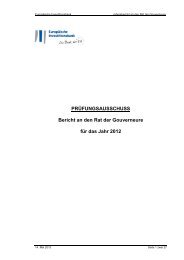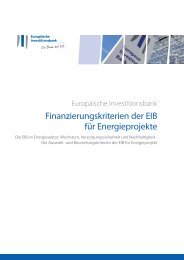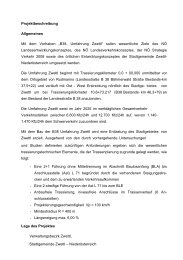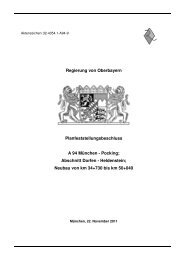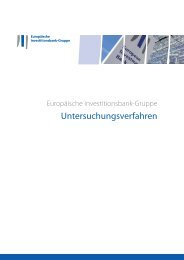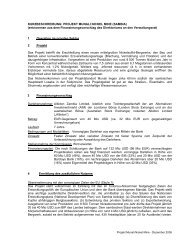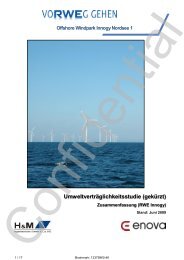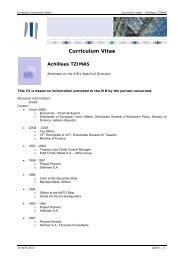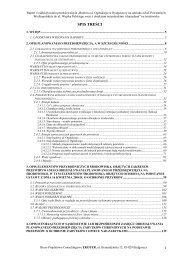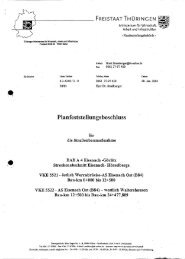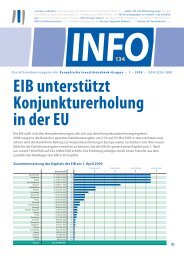EIB Papers Volume 13. n°1/2008 - European Investment Bank
EIB Papers Volume 13. n°1/2008 - European Investment Bank
EIB Papers Volume 13. n°1/2008 - European Investment Bank
Create successful ePaper yourself
Turn your PDF publications into a flip-book with our unique Google optimized e-Paper software.
1. Introduction<br />
Macro-fiscal policy challenges<br />
and public investment in new<br />
EU member states<br />
Fiscal policy in the new EU member states (NMS) faces a challenging dilemma. 1 On the one hand,<br />
fiscal policy must support growth and convergence by allowing increased levels of investment, not<br />
least to upgrade infrastructure. On the other hand, fiscal policy must safeguard macroeconomic<br />
stability and fulfil the budget requirements of the EU Stability and Growth Pact, while facing<br />
additional expenditure needs for complying with the <strong>European</strong> laws and standards (the so called<br />
Acquis Communitaire). 2 These standards call for reforms in the labour market, the tax and pension<br />
systems, subsidy schemes, and other areas, which may entail up-front costs. In addition, many<br />
countries must prepare to buffer the impact of increasing expenditure pressures related to an aging<br />
population within a sustainable medium- to long-term macro-fiscal framework.<br />
To varying degrees, many NMS have carried out fiscal adjustment in recent years, with implications<br />
for the level of public investment. Although a large part of this adjustment has fallen upon public<br />
expenditures, including public investment, reductions in domestic funding for public investment<br />
have, to some extent, been counterbalanced by the availability of new financing support. Part of<br />
this financing has been provided by EU funds directed toward projects with a regional impact and<br />
of common <strong>European</strong> interest. In addition, many countries are advancing the implementation of<br />
public-private partnerships (PPPs) as an alternative to traditional public investment to develop<br />
infrastructure.<br />
Against this background, this paper looks at some specific fiscal policy and public investment<br />
issues in the NMS. In particular, the paper aims to address the following questions. First, what do<br />
recent growth experiences in NMS imply for macro-fiscal coordination? Second, what has been the<br />
impact of fiscal adjustment on public investment levels? Third, where do NMS stand with respect to<br />
infrastructure? Fourth, what is the role of new financing sources, including EU funds and PPPs?<br />
Strong fiscal positions are critical for reducing macroeconomic vulnerabilities and enhancing<br />
growth prospects in the NMS. In general, fiscal policies should aim to raise the efficient use of the<br />
whole envelope of available financing to address investment needs. Still, the diversity of growth<br />
experiences and fiscal policy stances among NMS underscores that country-specific fiscal strategies<br />
are needed. While some countries have resorted to investment cuts to consolidate fiscal positions,<br />
others have been more successful in both accommodating higher levels of investment and reducing<br />
fiscal imbalances. Also, new available financing presents opportunities as well as challenges,<br />
requiring improvements in the institutional framework for investment and PPPs. In the case of<br />
EU funds, absorbing the substantial additional resources under the new financial perspective will<br />
demand important efforts to reallocate expenditures and to step up absorptive capacities. Similarly,<br />
1 For the purpose of this study, the NMS include the countries that became members of the EU in May 2004, plus Bulgaria<br />
and Romania that became members in early 2007.<br />
2 This term denotes the treaties, regulations and directives passed by the <strong>European</strong> institutions as well as judgments laid<br />
down by the Court of Justice. Candidate countries must adopt, implement, and enforce all the acquis to be allowed<br />
to join the EU. In addition, they often have to set up or change the relevant administrative or judicial bodies which<br />
oversee the legislation. The “chapters” of the acquis address, for example, issues related to the free movement of goods,<br />
services, persons, and capital, company law, competition, transport, energy, research, industrial policy, education, energy,<br />
environment, culture, consumers, and health protection, as well as stipulations for cooperation in the fields of justice,<br />
customs, foreign and security policy, and financial and budgetary provisions.<br />
Gerd Schwartz<br />
Ana Corbacho<br />
Qiang Cui<br />
Giovanni Ganelli<br />
Paolo Manasse<br />
<strong>EIB</strong> PAPERS <strong>Volume</strong>13 N°1 <strong>2008</strong> 115




